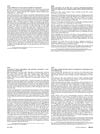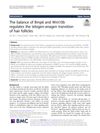 10 citations,
August 2018 in “Experimental Dermatology”
10 citations,
August 2018 in “Experimental Dermatology” Decorin helps hair cells grow and move, and keeps hair growth phase going in mice.
 9 citations,
January 2017 in “Food & Nutrition Research”
9 citations,
January 2017 in “Food & Nutrition Research” Rice bran mineral extract may help promote hair growth and prevent hair loss.
 8 citations,
May 2021 in “Applied Materials Today”
8 citations,
May 2021 in “Applied Materials Today” New nano composite helps reduce scars and regrow hair during burn wound healing.
 7 citations,
January 2019 in “Pharmaceutical Biology”
7 citations,
January 2019 in “Pharmaceutical Biology” Eclipta prostrata helps hair growth and maintains the growth phase by affecting certain growth factors.
 7 citations,
January 2010 in “Animal”
7 citations,
January 2010 in “Animal” Angora goat hair grows faster and produces more protein than cashmere goat hair, and certain hormones and nutrients positively affect hair growth and protein synthesis.
 5 citations,
December 2018 in “Biological & Pharmaceutical Bulletin”
5 citations,
December 2018 in “Biological & Pharmaceutical Bulletin” Norgalanthamine helps hair cells grow by activating certain pathways related to hair growth.
 4 citations,
October 2014 in “Journal of Integrative Agriculture”
4 citations,
October 2014 in “Journal of Integrative Agriculture” Researchers found 24 genes that change significantly and affect cashmere growth in goats; this could help increase cashmere production.
 3 citations,
March 2020 in “International Journal of Molecular Sciences”
3 citations,
March 2020 in “International Journal of Molecular Sciences” Thymosin β4 helps increase hair growth in Cashmere goats.
 3 citations,
April 2016 in “Food Science and Biotechnology”
3 citations,
April 2016 in “Food Science and Biotechnology” Oriental melon leaf extract may help hair grow and keep it in the growing phase longer.
 1 citations,
April 2024 in “Journal of Pharmaceutical and Pharmacological Sciences”
1 citations,
April 2024 in “Journal of Pharmaceutical and Pharmacological Sciences” The mouse models are effective for testing new hair loss treatments.
 July 2024 in “Biological and Pharmaceutical Bulletin”
July 2024 in “Biological and Pharmaceutical Bulletin” Licorice extract helps hair growth and may treat hair loss.
 March 2024 in “Journal of Microbiology and Biotechnology”
March 2024 in “Journal of Microbiology and Biotechnology” Phloroglucinol may help improve hair loss by promoting hair growth and reducing oxidative stress.
 January 2023 in “Frontiers in bioscience”
January 2023 in “Frontiers in bioscience” Artemis protein may help control hair growth and health by influencing cell processes.
 April 2017 in “Journal of Investigative Dermatology”
April 2017 in “Journal of Investigative Dermatology” Blocking JAK-STAT5 signaling in mice leads to hair growth.
 April 2016 in “Journal of The American Academy of Dermatology”
April 2016 in “Journal of The American Academy of Dermatology” A child on life support experienced rapid hair loss due to severe illness affecting hair growth.
 January 2015 in “Journal of clinical and investigative dermatology”
January 2015 in “Journal of clinical and investigative dermatology” Clipping is the best method to prepare rats for studying hair loss from chemotherapy because it causes less skin damage and effectively gets hair to the right growth phase.
 127 citations,
December 2005 in “Experimental Dermatology”
127 citations,
December 2005 in “Experimental Dermatology” Stress can stop hair growth in mice, and treatments can reverse this effect.
 125 citations,
September 2001 in “The FASEB Journal”
125 citations,
September 2001 in “The FASEB Journal” Stress can cause hair loss by negatively affecting hair follicles and this effect might be reversed with specific treatments.
 87 citations,
January 2016 in “Development”
87 citations,
January 2016 in “Development” Blocking β-catenin in skin cells improves hair growth during wound healing.
 70 citations,
January 2009 in “The Journal of clinical endocrinology and metabolism/Journal of clinical endocrinology & metabolism”
70 citations,
January 2009 in “The Journal of clinical endocrinology and metabolism/Journal of clinical endocrinology & metabolism” Androgens slow hair growth by altering Wnt signaling in balding cells.
 69 citations,
December 2011 in “Journal of Ethnopharmacology”
69 citations,
December 2011 in “Journal of Ethnopharmacology” Some Thai plants, especially Carthamus tinctorius, could help prevent hair loss and promote hair growth without adverse effects.
 58 citations,
February 2016 in “Scientific reports”
58 citations,
February 2016 in “Scientific reports” Blocking BACE1 and BACE2 enzymes causes hair color loss in mice.
 35 citations,
February 2019 in “Cell Communication and Signaling”
35 citations,
February 2019 in “Cell Communication and Signaling” BMP6 and Wnt10b control whether hair follicles are resting or growing.
 33 citations,
January 1997 in “Endocrinology”
33 citations,
January 1997 in “Endocrinology” Testosterone can slow down hair growth when combined with certain cells from bald scalps, and this effect can be blocked by an androgen receptor blocker.
 22 citations,
August 2009 in “Evidence-based Complementary and Alternative Medicine”
22 citations,
August 2009 in “Evidence-based Complementary and Alternative Medicine” The composition with carnitine, thioctic acid, and saw palmetto extract may effectively reduce inflammation in hair follicle cells.
 16 citations,
September 2018 in “Journal of Ethnopharmacology”
16 citations,
September 2018 in “Journal of Ethnopharmacology” Plant-based remedies may treat hair loss by reducing inflammation and improving insulin resistance.
 4 citations,
November 2023 in “Frontiers in immunology”
4 citations,
November 2023 in “Frontiers in immunology” New treatments targeting T-cell pathways are needed for better alopecia areata management.
 2 citations,
March 2015 in “Hepatitis Monthly”
2 citations,
March 2015 in “Hepatitis Monthly” A woman's hair loss during Hepatitis C treatment with PEG-INF-a-2a and Ribavirin was reversible after stopping the medication.
 2 citations,
July 1982 in “British Journal of Dermatology”
2 citations,
July 1982 in “British Journal of Dermatology” Retinol acetate can reduce the harmful effects of the drug benoxaprofen on white blood cells.
 April 2018 in “Journal of Investigative Dermatology”
April 2018 in “Journal of Investigative Dermatology” A new peptide, FOL-005, may help treat excessive hair growth by reducing a hair growth promoter, FGF7.






























